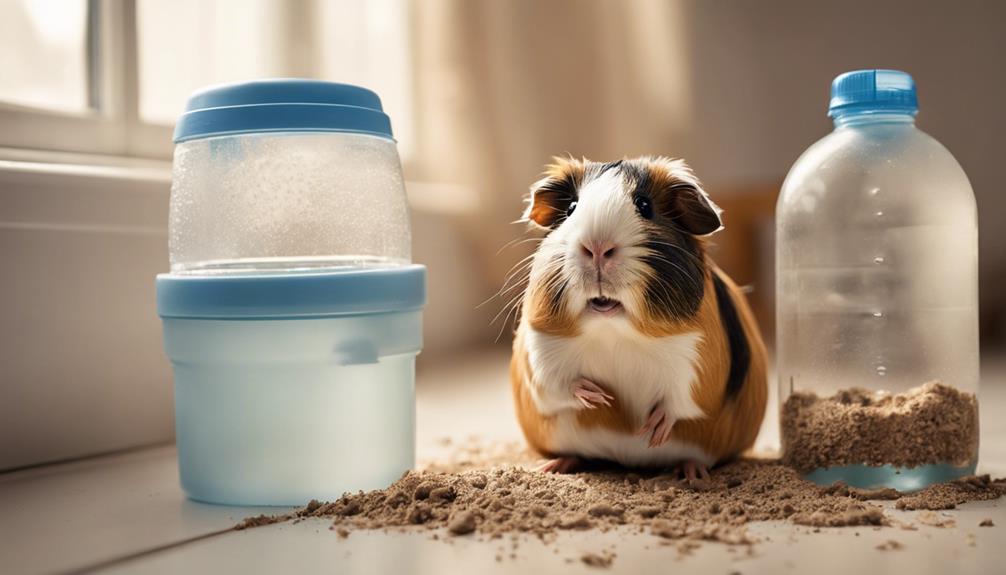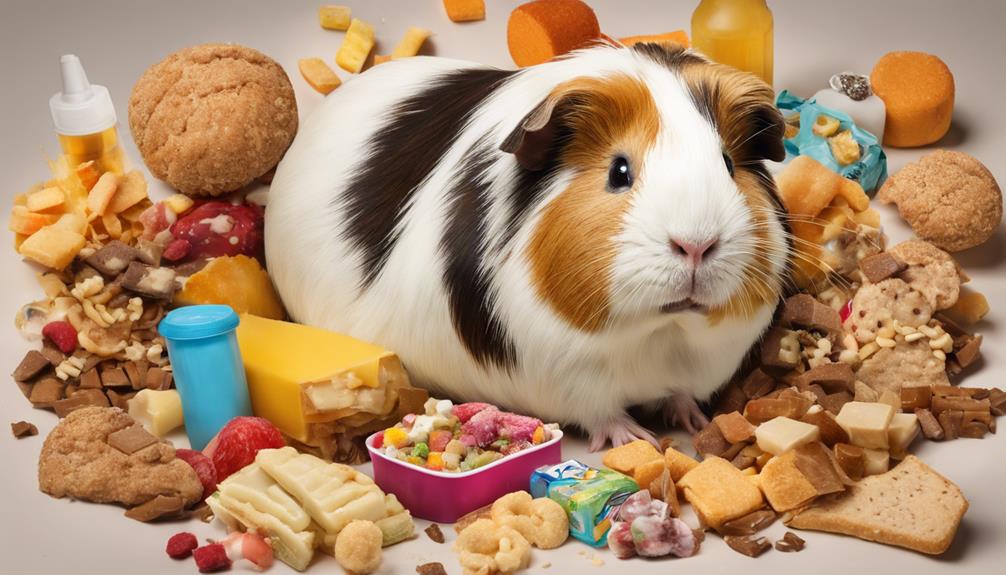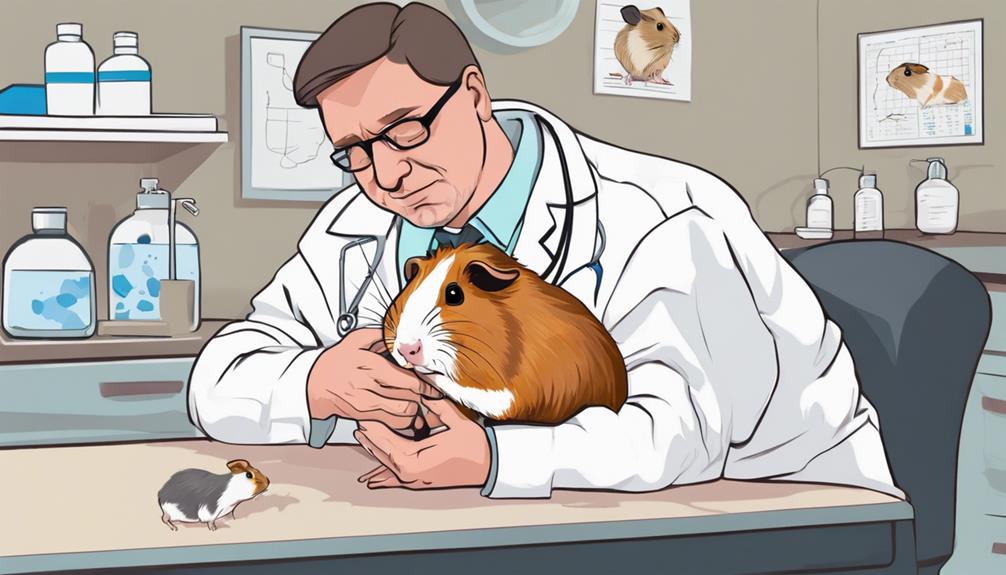What Are the Causes of Urinary Problems in Guinea Pigs?

Causes of Urinary Problems in Guinea Pigs:
Urinary tract infections and hormonal imbalances are common factors contributing to urinary issues in guinea pigs, affecting a significant percentage of these small pets.
Understanding these causes is crucial for prevention and management to ensure their well-being and quality of life.
Key Takeaways
- Urinary problems in guinea pigs stem from factors like infections, dehydration, poor diet, and bladder stones.
- Prevention involves hygiene, hydration, balanced diet, and treatment like behavioral modifications and surgery if needed.
- Genetic, age-related, hormonal, and environmental influences play significant roles in guinea pigs' urinary health.
- Monitoring symptoms, providing fresh water, and a clean, stress-free environment are vital for managing urinary issues effectively.
Urinary Tract Infections
Urinary tract infections commonly afflict guinea pigs, causing discomfort and potential health complications. These infections can be challenging to manage due to antibiotic resistance and the tendency for them to recur. When faced with a guinea pig suffering from a urinary tract infection, prompt treatment is vital to prevent further complications.
Treatment options for urinary tract infections in guinea pigs typically involve the administration of antibiotics prescribed by a veterinarian. It's important to follow the prescribed dosage and duration of the medication to make certain the infection is completely eradicated. Additionally, providing ample water and a clean living environment can aid in the recovery process and prevent future infections.
To prevent urinary tract infections from occurring, guinea pig owners should focus on maintaining good hygiene practices, such as regularly cleaning the cage and providing fresh bedding. Ensuring that the guinea pig has access to clean water at all times is also essential. By being proactive in implementing prevention strategies, owners can help reduce the likelihood of their guinea pig developing recurring infections.
Dehydration
Guinea pigs are susceptible to dehydration, which can lead to urinary problems. It's important to monitor their water intake to make sure they stay adequately hydrated.
Symptoms of dehydration in guinea pigs include sunken eyes, dry mouth, and reduced urination.
Water Intake Importance
Proper hydration is essential for maintaining ideal urinary health in guinea pigs. Guinea pigs need to have constant access to fresh, clean water to stay hydrated. Monitoring their hydration levels is critical as it directly impacts their behavior and overall health.
A well-balanced diet, rich in fresh vegetables and limited in sugary fruits, can contribute to their hydration. Ensuring that guinea pigs receive an adequate water supply is crucial in preventing urinary issues such as bladder stones or urinary tract infections.
Symptoms of Dehydration
Maintaining adequate hydration levels is key to ensuring the well-being of guinea pigs, with dehydration potentially leading to various concerning symptoms. Symptoms of dehydration in guinea pigs may include dry or sticky gums, sunken eyes, lethargy, decreased appetite, and skin that doesn't bounce back when gently pinched.
To prevent dehydration, make sure your guinea pig has constant access to fresh, clean water, especially during warmer weather. If dehydration is suspected, immediate veterinary attention is vital. Treatment options for dehydration in guinea pigs may include fluid therapy to rehydrate the animal.
Acting promptly is crucial, as dehydration can quickly become life-threatening for guinea pigs. Always consult with a veterinarian for proper diagnosis and treatment.
Poor Diet

Inadequate nutrition can contribute substantially to urinary problems in guinea pigs. Dietary imbalances and nutritional deficiencies can lead to digestive health issues, which in turn may result in urinary concerns. A poor diet lacking essential nutrients can weaken a guinea pig's overall health, making them more susceptible to urinary tract problems. Owners must be mindful of what they feed their pets to guarantee they receive a well-rounded and balanced diet that supports their urinary system.
To highlight the impact of a poor diet on guinea pigs' urinary health, consider the following table:
| Negative Effects of Poor Diet | Consequences |
|---|---|
| Dietary Imbalances | Digestive issues |
| Nutritional Deficiencies | Weak immune system |
| Lack of essential nutrients | Urinary tract problems |
| High sugar intake | Increased risk of UTIs |
| Insufficient water intake | Concentrated urine |
Bladder Stones
Bladder stones in guinea pigs can lead to discomfort and serious health issues. Understanding the formation process, recognizing the symptoms and signs, and knowing the available treatment options are essential.
Stone Formation Process
How do stones form in the bladder of guinea pigs?
The formation of bladder stones in guinea pigs is often linked to their diet. A diet analysis is essential in understanding and preventing this issue. High levels of calcium in the diet can lead to the development of these stones. To prevent this, dietary adjustments are necessary.
Guinea pigs require a balanced diet that's low in calcium to maintain their urinary health. Ensuring they have access to fresh hay, a variety of vegetables, and limited pellets can help regulate their calcium intake. By carefully monitoring and controlling their diet, owners can play a proactive role in preventing the formation of bladder stones in their beloved guinea pigs.
Symptoms and Signs
The presence of bladder stones in guinea pigs manifests through specific symptoms and signs that warrant prompt attention from owners. Signs may include blood in the urine, straining to urinate, vocalization during urination, reduced or lack of urine output, and discomfort when touched in the abdominal area.
If left untreated, bladder stones can lead to serious complications such as urinary tract infections and blockages. To diagnose bladder stones, a veterinarian may perform imaging tests like X-rays or ultrasounds. Important veterinary care is essential for proper treatment.
Treatment options may include surgery to remove the stones or dietary changes to dissolve them. Prevention strategies such as providing a balanced diet and ensuring adequate hydration can help reduce the risk of bladder stone formation in guinea pigs.
Treatment Options
Effective management of urinary problems in guinea pigs involves implementing a thorough approach that addresses the underlying causes and promotes overall bladder health. When it comes to treating bladder stones in guinea pigs, a combination of behavioral modifications, dietary changes, medication therapy, and surgical options can be considered. The table below outlines these treatment options to help guide guinea pig owners in providing the best care for their pets.
| Treatment Options | Description |
|---|---|
| Behavioral Modifications | Encourage increased water intake and provide opportunities for regular exercise. |
| Dietary Changes | Offer a diet rich in hay and limited in calcium-rich foods to prevent stone formation. |
| Medication Therapy | Administer prescribed medications to dissolve or manage bladder stones. |
| Surgical Options | Consult a veterinarian for procedures like cystotomy to remove large stones. |
Stress
When guinea pigs experience prolonged periods of stress, they may develop urinary problems. Behavior modification and stress management techniques can help alleviate stress in guinea pigs.
Providing environmental enrichment, such as toys, tunnels, and hiding spots, can reduce stress levels. Additionally, incorporating relaxation techniques like soothing music or gentle petting sessions can help guinea pigs feel more at ease in their environment.
It is important to create a calm and comfortable living space for guinea pigs to minimize stress-induced urinary issues. Regular interaction with gentle handling can also help build trust and reduce anxiety in these small animals. Monitoring their behavior for signs of stress, such as excessive hiding, aggression, or changes in eating habits, is vital in addressing potential urinary problems early on.
Genetics

Periodically, genetic factors can contribute to urinary problems in guinea pigs. Inheritance patterns and genetic mutations play an important role in predisposing certain guinea pigs to urinary issues. Breeding implications are significant when considering hereditary traits that may impact the urinary system of these small animals.
Genetic mutations can lead to structural abnormalities in the urinary tract of guinea pigs, making them more susceptible to conditions such as urinary obstructions or infections. These mutations can be passed down through breeding, highlighting the importance of responsible breeding practices to avoid passing on detrimental traits.
Understanding the genetic predispositions of guinea pigs can help breeders make informed decisions to prevent urinary problems in future generations. By identifying and selectively breeding individuals with a lower risk of genetic urinary issues, breeders can reduce the prevalence of these problems within the guinea pig population. Ultimately, recognizing the role of genetics in urinary problems is important for promoting the health and well-being of these beloved pets.
As guinea pigs age, physiological changes in their urinary system may contribute to the development of urinary problems. These changes can lead to an increased risk of issues such as urinary tract infections, bladder stones, and incontinence. One key factor to take into account in managing age-related urinary problems in guinea pigs is adjusting their dietary needs.
Older guinea pigs may require a diet that's lower in calcium to prevent the formation of bladder stones, a common issue in aging pets. Additionally, ensuring that aging guinea pigs have access to fresh water at all times is important for their urinary health.
Furthermore, as guinea pigs age, their exercise requirements may change. While younger guinea pigs are typically more active, older guinea pigs may need gentler forms of exercise to maintain their overall health and prevent obesity, which can exacerbate urinary problems. Providing appropriate opportunities for exercise tailored to the needs of older guinea pigs can help support their urinary system function and overall well-being.
Hormonal Imbalances

With age-related changes potentially impacting the urinary system of guinea pigs, imperative imbalances can also play a significant role in contributing to urinary problems in these small pets. Imperative regulation is essential for the proper functioning of the endocrine system, which controls various bodily functions, including those related to the urinary tract. When there's a disruption in imperative balance, it can lead to issues such as excessive urine production, changes in urine concentration, or even the development of urinary stones.
The endocrine system in guinea pigs is delicate, and imperative imbalances can arise due to factors like stress, underlying health conditions, or even dietary imbalances. For instance, an overactive adrenal gland can result in an excess of certain hormones that affect the urinary system. Additionally, imperative changes associated with aging can also influence urinary function in guinea pigs.
Understanding the role of imperative regulation in urinary health is essential for guinea pig owners and caregivers. Monitoring the symptoms of imperative imbalances and seeking veterinary care promptly can help address urinary problems effectively and improve the overall well-being of these beloved pets.
Frequently Asked Questions
Can Urinary Problems in Guinea Pigs Be Prevented Through Regular Check-Ups and Screenings?
Regular check-ups and screenings are key to preventing urinary problems in guinea pigs. By following veterinary recommendations for dietary requirements and health monitoring, owners can guarantee their pets stay healthy and catch any issues early on.
Are There Any Specific Warning Signs or Symptoms to Watch Out for That Indicate a Urinary Problem in Guinea Pigs?
Warning signs of urinary problems in guinea pigs include changes in urination frequency, blood in urine, or straining during urination. Dietary changes and behavioral shifts can indicate issues. Prompt veterinary care is vital. Treatment options vary based on the underlying cause.
How Can a Guinea Pig's Living Environment Impact Their Urinary Health?
A guinea pig's living environment can greatly impact their urinary health. Diet impacts hydration levels, stress factors, and exercise routines are essential. Ensuring a clean, spacious habitat, providing fresh water and a balanced diet, and minimizing stressors can promote urinary well-being.
Are There Any Natural Remedies or Supplements That Can Help Improve Urinary Health in Guinea Pigs?
In the quest for better urinary health in guinea pigs, herbal remedies and dietary supplements offer promising support. By making strategic behavioral changes and ensuring peak hydration levels, caregivers can enhance their furry friends' well-being.
Are There Any Specific Breeds of Guinea Pigs That Are More Prone to Urinary Problems Than Others?
Certain guinea pig breeds, due to genetic predisposition, may be more prone to urinary problems. Factors like diet and hydration levels also play a key role in maintaining urinary health across all breeds.











